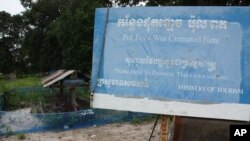The Documentation Center of Cambodia says it plans to preserve parts of the Khmer Rouge stronghold of Anlong Veng, near the Thai border, as a historical site.
The plans include the preservation of the meeting rooms of Pol Pot and the house of former Khmer Rouge commander Ta Mok and the installation of information kiosks in the town.
“When people see this, they will know that our country passed through genocide and civil war before having peace,” said Ly Sok Kheang, director of the Anlong Veng Peace Center.
Khmer Rouge troops in the area reintegrated into the government in 1998, marking the beginning of a fragile peace and paving the way to reconciliation following decades of civil war.
Ly Sok Kheang said a history book for middle school and high school has been printed, along with a guidebook for tourists, all in an attempt to prevent atrocities in the future. Such things are to be remembered, he said, “not only by this generation but by future generations.”
Latt Ky, who monitors the U.N.-backed Khmer Rouge tribunal for the rights group Adhoc, said the projects seem to have the support of some victims, especially civil party complainants at the court.
“In general, they wish to have those legacies of the Khmer Rouge era, as well as the main stupa in the township [of Anlong Veng].”
The project should not be blocked by politicians uneasy with the history that the project may raise, he added.
Hor Chinvirakyuth, the governor of Anlong Veng, told VOA Khmer that the project needs to be done according to government guidelines, and that meetings are held every three months to discuss it.
The development of Anlong Veng has been under discussion for at least 10 years.
Chum Mey, a survivor of the notorious Tuol Sleng prison in Phnom Penh, said former Khmer Rouge sites should be preserved as education sites to prevent another genocide.
Tuol Sleng is already a museum with a memorial to the victims of the Khmer Rouge, who are blamed for up to 2 million deaths during their rule from 1975 to 1979.
Only two former leaders of the communist group have stood trial for their role in the genocide. All of the other senior leaders are dead or have been ruled incompetent to stand trial.
This report was produced in collaboration with VOA's Khmer Service.




